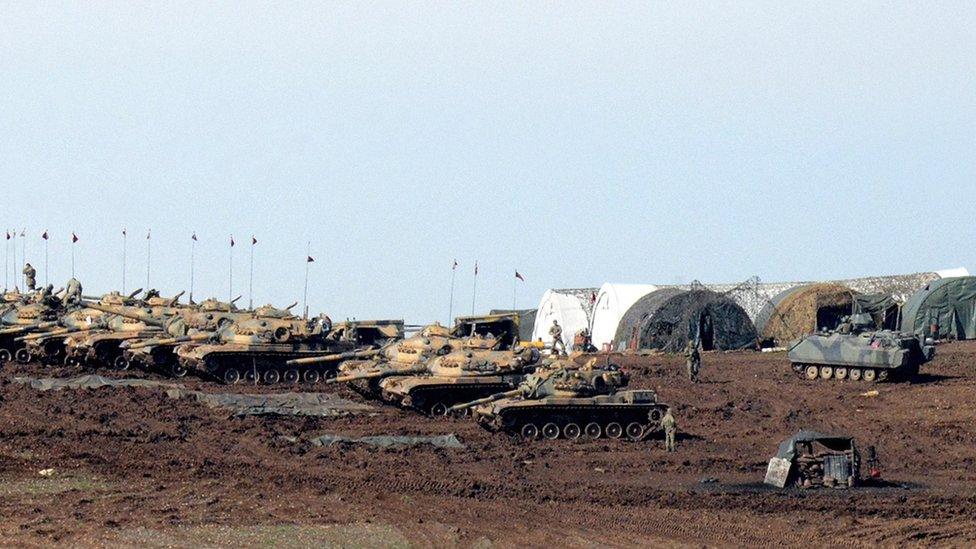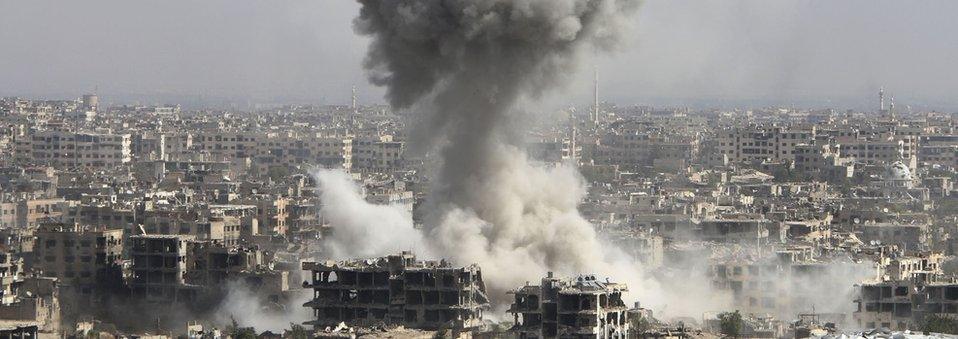Syria conflict: Turkey shells Kurdish militia
- Published

Turkish tanks are seen on the border with Syria in this file photo
Turkey has shelled a Kurdish militia in northern Syria and demanded it retreat from territory it has seized, Prime Minister Ahmet Davutoglu said.
The US urged Turkey to stop the shelling and focus on fighting the group Islamic State (IS).
Meanwhile Turkey's foreign minister said Turkey was mulling a ground invasion of Syria with Saudi forces.
On Thursday world powers agreed to push for a cessation of hostilities in Syria within a week.
Among the targets shelled by Turkey was the Menagh airbase, which was seized on Thursday from Syrian Islamist rebels by a Kurdish militia group known as the YPG.
Speaking on Turkish TV, PM Davutoglu warned that Turkey would retaliate if the YPG did not leave the airbase, which lies south of the town of Azaz and near the Turkish border.
How Putin is succeeding in Syria
Displaced Syrians struggle to survive
Syria: The story of the conflict
Turkey sees the YPG as being linked with Kurdish guerrillas from the Kurdistan Workers Party (PKK), which has waged a campaign against security forces in Turkey itself for decades.
Mr Davutoglu accused the Kurdish militiamen of attacking ethnic Arabs and Turkmen in what amounted to "war crimes".
US State Department spokesman John Kirby also urged the YPG not to "take advantage of a confused situation" by seizing new territory.
Mr Kirby said Turkey and the YPG were both threatened by IS, whose fighters were located to the east of Azaz.
"We continue to encourage all parties to focus on this common threat, which has not subsided," he said.
The horrifying statistics that define Syria
On Saturday, Turkey's Foreign Minister Mevlut Cavusoglu said it was possible that troops from his country and Saudi Arabia might participate in a ground operation against IS forces.
Saudi Arabia will send war planes to the Turkish airbase of Incirlik to carry out air strikes on IS militants, Mr Cavusoglu said.
The US has so far ruled out a ground invasion of Syria, while Moscow has warned against such a development, saying it could lead to a world war.
World powers have instead agreed a tentative deal to try to bring about a cessation of hostilities and allow more access for humanitarian aid.
In a rare interview with AFP news agency Syrian President Bashar al-Assad has said that he intends to retake "the whole country".
Under the plan, efforts will be made to try to make urgent aid deliveries to besieged and hard-to-reach areas in Syria. Steps will also be taken to work towards an eventual ceasefire and implementation of a UN-backed plan for political transition, external in Syria.
The halt would not apply to the battle against jihadist groups IS and al-Nusra Front.
However, neither the Syrian government nor the rebels were involved in the deal and both have since vowed to continue fighting.
Syrian President Bashar al-Assad said on Friday that he intended to retake "the whole country" from rebels.
Lyse Doucet: Russia's involvement has changed the balance of power in Syria
Russia accused
Syrian government forces, backed by Russian air strikes, have almost encircled rebels in parts of the northern city of Aleppo.
However, Russia has come under pressure from Western countries over civilian deaths in Syria, with France and the US urging greater caution.

French PM Manuel Valls and US Secretary of State John Kerry said civilians were dying in Russian air strikes.
One observers' group says at least 1,015 civilians, external have been killed in Russian air strikes.
Russia, an ally of Syrian President Bashar al-Assad, has consistently denied hitting civilian targets and insists it is battling terrorists.
More than 250,000 people have been killed and some 11 million displaced in almost five years of fighting in Syria.

Syria conflict - key questions

Why is there a war in Syria?
Anti-government protests developed into a civil war that, five years on, has ground to a stalemate, with the Assad government, Islamic State, an array of Syrian rebels and Kurdish fighters all holding territory.
Who is fighting whom?
Government forces concentrated in Damascus and the centre and west of Syria are fighting the jihadists of Islamic State and al-Nusra Front, as well as less numerous so-called "moderate" rebel groups, who are strongest in the north and east. These groups are also battling each other.
How has the world reacted?
Iran, Russia and Lebanon's Hezbollah movement are propping up the Alawite-led Assad government, while Turkey, Saudi Arabia and Qatar back the Sunni-dominated opposition, along with the US, UK and France. Hezbollah and Iran are believed to have troops and officers on the ground, while a Western-led coalition and Russia are carrying out air strikes.
